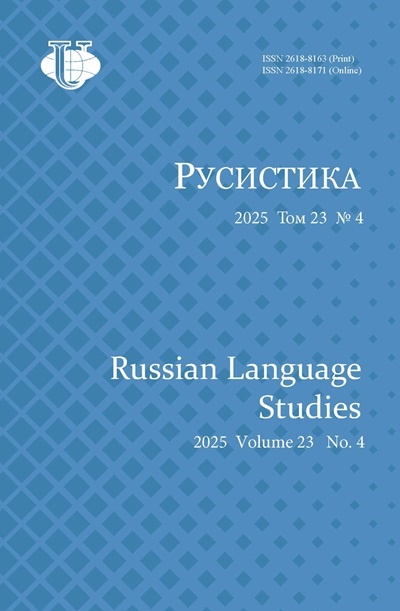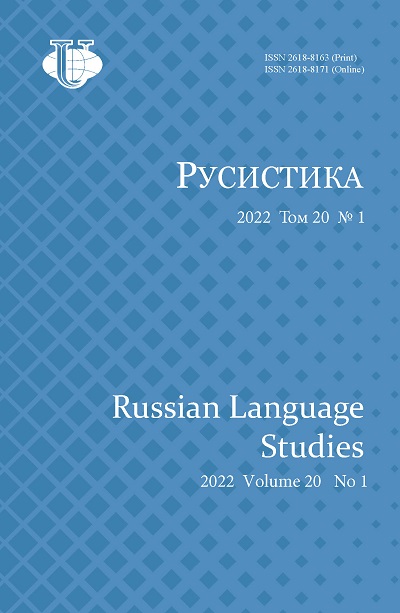Том 20, № 1 (2022)
- Год: 2022
- Статей: 8
- URL: https://journals.rudn.ru/russian-language-studies/issue/view/1532
- DOI: https://doi.org/10.22363/2618-8163-2022-20-1
Весь выпуск
Русский язык в мировом пространстве
Когда твой язык исчезает: канадский духоборческий русский
Аннотация
Рассматривается отношение канадских духоборцев (духоборов) к русскому языку. Канадские духоборцы, иммигрировавшие в Канаду в 1899 г., представляют собой религиозное и этническое меньшинство русского происхождения. Актуальность работы обусловлена недостаточностью исследований этой уникальной культурно-лингвистической группы, а также возможностью описания динамики утраты языка. Это первое исследование, посвященное языковым отношениям среди духоборцев. Его цель состоит в описании отношения духоборческих информантов к русскому языку их наследия. В задачи исследования входит описание сохранившихся функций языка в общине и перспектив его сохранения. Материалы исследования составляют интервью с 40 носителями духоборческого русского языка, англо-русскими билингвами. Интервью были записаны в Британской Колумбии и Саскачеване (исторических провинциях проживания духоборцев) с 2012 по 2018 г. Методология, основанная на исследованиях в областях языков наследия и социолингвистики, включает дискурсивный анализ тематически кодированных транскриптов интервью. Результаты исследования показывают, что носители языка эмоционально привязаны к нему и русский язык важен для духоборческих молений, отражения верований в псалмах, чтения русской литературы, поездок и обучения в России и т. д. С другой стороны, некоторые носители полагают, что их язык ниже по статусу, чем стандартный русский, из-за антидиалектных реакций русских граждан, с которыми они состояли в контакте. Многие информанты скептически относятся к возможности возрождения языка в общине. Результаты обсуждаются в свете авторской теории лингвистического эквилибриума. В завершение обозначено возможное применение результатов для возрождения языка. Перспективы исследования состоят в их применении в теориях билингвизма и мультилингвизма, языков наследия и описаниях утраты языков.
 7-21
7-21


Лингвокультурология: теоретические и прикладные аспекты
Прозвища как лингводидактический материал
Аннотация
Цель работы - обосновать необходимость использования в рамках курса русского языка как иностранного такого разряда имен собственных, как прозвища. Иллюстративным материалом послужили общеизвестные, культурно значимые прозвища исторических и политических деятелей, а также современные неофициальные именования. Актуальность исследования обеспечивается тем, что отбор антропонимов для учебных материалов не релевантен современной лингвистической, лингво- и социокультурной ситуации. В частности, существует противоречие между утвердившимся в обществе негативным отношением к прозвищам и реальным их положением в русской антропонимической системе. Вследствие недооценки роли прозвищ в социуме данный вид антропонимов не представлен в дидактических материалах по русскому языку как иностранному (РКИ). Однако ввести прозвища в лингводидактику целесообразно, поскольку они являются фактом русского лингвокультурного пространства и отвечают основным подходам современной отечественной педагогики: компетентностному, метапредметному и аксиологическому. В качестве ведущего использован дескриптивно-аналитический метод. Прозвища рассмотрены как разряд антропонимов. Показано, что прозвища - факт языковой и социальной коммуникации, явление языковое, социокультурное и индивидуально-психологическое. Прозвища полифункциональны: выполняют различные функции. Отбор материала для преподавания РКИ должен осуществляться с учетом актуальности, когнитивной значимости и коммуникативной ценности прозвищ; необходимо отличать их от сходных разрядов - псевдонимов и никнеймов. Адекватности отбора будет способствовать опора на предложенную автором классификацию прозвищ. Такой подход способствует в некоторой степени преодолению «отрыва от реальности» и повышению качества обучения иностранцев русскому языку, формированию у них различных компетенций, совершенствованию их языковой личности, приобщению к русской культуре.
 22-34
22-34


Прецедентное имя В.И. Ленин в русском культурном пространстве
Аннотация
Актуальность исследования заключается в необходимости выявления социокультурных и национальных смысловых компонентов содержания прецедентного имени Ленин в культурном пространстве носителей русского языка. Изучение прецедентных имен - это возможные путь и ключ к описанию и выявлению культурно-национальных ценностей носителей того или иного языка. Цель работы состоит в рассмотрении и выявлении культурно-национальных особенностей восприятия и понимания имени Ленин носителями русского языка. Для достижения поставленной цели использовались описательный и статистический методы, а также методы наблюдения, психосемантического и лингвокультурологического анализа. Материалом для анализа послужили этимологические и энциклопедические словари русского языка, данные свободных ассоциативных экспериментов из Русского ассоциативного словаря, Сибирского ассоциативного словаря, Русского регионального словаря-тезауруса ЕВРАС, контексты, содержащие имя Ленин , из современных российских СМИ, выбранные из Национального корпуса русского языка. Новизна статьи в том, что в ней впервые описана семантика имени собственного Ленин в русском языке, построено ассоциативное поле на стимул Ленин в русском языковом сознании, рассмотрены и выявлены культурно-национальные особенности восприятия и понимания указанного имени носителем русского языка в текстах современных российских СМИ, выявлены социокультурные и национальные смысловые компоненты содержания прецедентного имени Ленин в культурном пространстве носителей русского языка. Научная значимость исследования заключается, с одной стороны, в предварительной попытке применения лингвокультурологического и психолингвистического подходов к анализу прецедентного имени в русском культурном пространстве, а с другой стороны, в возможности использовать материал в преподавании теоретических курсов лингвокультурологии, психолингвистики и медиалингвистики, а также на курсах межкультурной коммуникации.
 35-51
35-51


Трансформации в семантике вербализаторов этических концептов «Любовь» - «Милосердие» - «Целомудрие» - «Добродетель»
Аннотация
Актуальность исследования определяется необходимостью выявления семантических сдвигов этически значимых концептов и их смысловой искаженности в сознании носителей русского языка для создания актуальной картины, позволяющей понять степень сформированности духовно-нравственных ценностей и сохранения ментальности русского народа у современной молодежи. Цель исследования - проследить изменение смыслов доминантных вербализаторов этических концептов «Любовь», «Милосердие», «Целомудрие», «Добродетель» и определить влияние этих изменений на лингвокультурное сознание современных носителей русского языка. Данная цель может быть достигнута с помощью междисциплинарного подхода к исследовательским методам. Так, в работе над материалом использовались сравнительно-исторический метод, частный метод семантических долей (Е.М. Верещагин, В.Г. Костомаров), методы социолингвистического опроса, когнитивной интерпретации результатов ассоциативных экспериментов и др. Соответственно, материалы исследования неоднородны по своему онтологическому статусу: это данные толковых словарей русского и церковнославянского языков, ассоциативных словарей и социолингвистических опросов. Определены этические смысловые доли указанных концептов, установлена их связь с православным мировоззрением. Изучены представления современной студенческой молодежи о выбранных этических концептах, указаны трансформации в их понимании и оценке. Предлагается не ограничиваться простой констатацией выявленных семантических сдвигов в семантике исследуемых вербализаторов этических концептов, но оценить создавшуюся ситуацию в контексте современных цивилизационных процессов в постсекулярном мире.
 52-67
52-67


Культура русской речи
Вариативность акцентуации имен существительных в речи современной молодежи
Аннотация
Звучащая речь представляет собой на сегодняшний день наиболее динамичный и вариативный сегмент языковой системы. Непрекращающиеся изменения акцентологических норм, их динамика в значительной степени определяют значимость данного исследования. Не менее актуальными становятся проблемы, связанные с предпочтением выбора варианта ударения современным молодым поколением. Затрагиваются вопросы расстановки ударения в ряде имен существительных, являющихся акцентологическими вариантами. Цель работы - описать фиксацию ударения в рассматриваемых лексемах по современным орфоэпическим словарям, соотнести полученные результаты с данными изданных ранее лексикографических источников, а также выявить предпочтения в расстановке ударения российских студентов двух технических вузов г. Иваново - Ивановского государственного химико-технологического университета и Ивановского государственного политехнического университета. Предпринята попытка установить соответствующие корреляции между нормативными и узуальными реализациями акцентных моделей указанной группы лексических единиц. На основе проведенного исследования представилось возможным сделать вывод об отсутствии единой словарной фиксации ударения в контрольной группе лексем. Установлено, что, несмотря на возможность вариативности, предоставляемой лексикографическими источниками, современные студенты предпочитают использовать в речи лишь один вариант ударения. Таким образом, выявилась значительная дивергенция между нормативными и узуальными реализациями акцентных моделей существительных.
 68-83
68-83


Актуальные проблемы исследований русского языка
Грамматика русского предлога: теоретические аспекты
Аннотация
В настоящее время лингвисты не располагают достаточным инструментарием для строгого определения принадлежности (непринадлежности) конкретных предложных единиц к предлогу как части речи, поэтому релевантным представляется рассмотрение функционально-грамматического поля предлога, включающего и собственно предлоги, и единицы, способные функционировать в качестве предлогов. Цели работы - выявление, классификация и описание системных парадигматических связей внутри функционально-грамматического поля предлога. Исследование проводилось на материале реестра из 3000 предложных единиц, который был собран путем сплошной выборки из словарей и специализированных работ, а также путем установления всех возможных вариантов предлогов в сети Интернет и Национальном корпусе русского языка. В результате выявлены графическая, морфонологическая и словообразовательная парадигмы предложных единиц, а также детализированы их морфосинтаксические и семантические парадигматические отношения. Графическая парадигма представляет собой ряды вариантов различного типа: алфавитных, графически слитных/раздельных и некодифицированных. Морфонологическая парадигма включает вокализованные, ударные, неполногласные, усеченные, смягченные, различающиеся ударением и флективные варианты. В рамках словообразовательной парадигмы выявлены наиболее продуктивные для образования предложных единиц корни. Для морфосинтаксической парадигмы определены возможные структурные подтипы: так, релевантными для образования парадигмы оказались форма предлогообразующего существительного и форма вводимого актанта. Кроме того, выявлены закономерности формирования парадигм для предложных единиц, выражающих разные типы семантических отношений. Для семантической парадигмы обнаружена зависимость конкретного подтипа парадигмы от вида смысловых отношений, выражаемых предложными единицами. Рассмотрение функционально-грамматического поля предлога как множества, организованного регулярными связями различных типов, позволяет говорить о грамматике предлога. Понимание системных соотношений предложных единиц открывает путь для прогнозирования системно возможных языковых единиц внутри рассматриваемого поля.
 84-100
84-100


Методика преподавания русского языка как родного, неродного, иностранного
Орфографическая грамотность русскоязычных школьников Латвии
Аннотация
Исследование посвящено одной из важнейших проблем речевого развития русскоязычных школьников диаспоры (4, 6, 9-й классы) - орфографической грамотности и призвано внести вклад в ее разработку. Актуальность проблемы обусловлена тем, что качество русской письменной речи, в том числе орфографические знания и умения учеников-билингвов, проживающих за пределами России, до сих пор недостаточно изучены. Цель исследования - охарактеризовать орфографическую грамотность латвийских русскоязычных учащихся в 2015-2021 годах. Материалом послужили письменные работы 11 938 учеников, разработанные автором статьи и специалистами Министерства образовании и науки Латвии. Были использованы сравнительный и статистический методы исследования, а также фокус-групповая дискуссия. Результаты исследования показали, что: 1) уровень орфографической грамотности латвийских русскоязычных билингвов из года в год остается низким; 2) в речи учеников всех возрастов констатированы одни и те же типичные орфографические ошибки, однако частотность данных ошибок зависит от того, по какой билингвальной модели учатся школьники; 3) ученики испытывают трудности в орфографической аргументации; 4) главные причины нарушения орфографических норм русского языка - низкая мотивация школьников к развитию грамотной письменной речи, межъязыковая интерференция, отсутствие достаточного учебного времени для изучения орфографического материала русского языка в школе; 5) в ценностной парадигме учеников грамотность в русском языке является менее важной, чем в английском и латышском языках. Согласно новой реформе образования Латвии (Skola2030) количество уроков русского языка в школах национальных меньшинств существенно уменьшается, поэтому в ближайшие годы можно прогнозировать еще большее снижение уровня орфографической грамотности школьников. В связи с этим понимание объективных орфографических трудностей, с которыми сталкиваются ученики-билингвы, открывает перспективы для поиска эффективных орфографических стратегий в процессе обучения школьников родному языку в меняющихся условиях.
 101-114
101-114


Применение технологии «перевернутый класс» на занятиях с иностранными студентами нефилологических специальностей
Аннотация
Описывается адаптированный вариант инновационной технологии «перевернутый класс», которую можно использовать в практике преподавания русского языка как иностранного (РКИ), особенно в условиях дистанционного обучения. Актуальность исследования обусловлена необходимостью создания методики, отвечающей интересам современного поколения студентов и эффективной в условиях удаленного ведения образовательного процесса. Цель - предложить методику применения в иноязычной аудитории технологии «перевернутый класс», интегрированной с использованием аутентичных русских фильмов, являющихся экранными адаптациями художественных литературных произведений. Для достижения поставленной цели применялись методы анализа, систематизации, обобщения, описания и др. Материалами исследования являлись художественный фильм «Не может быть!» (режиссер Л. Гайдай, 1975 г.), рассказы М.М. Зощенко «Галоша», «Забавное приключение», «Свадебное происшествие», пьеса «Преступление и наказание». Предлагаемая методика прошла успешную апробацию с иностранными студентами нефилологических специальностей. Инновационная технология «перевернутый класс» адаптировалась для использования в практике преподавания РКИ в условиях дистанционного обучения, подбирались аутентичные фильмы - экранизации русских литературных произведений, разрабатывалась система упражнений. Проводился эксперимент по применению авторской методики, а затем корректировалась гипотеза с учетом анкетирования и контрольного тестирования студентов. Результаты показали, что применение рассматриваемой технологии позволило повысить эффективность образовательного процесса, увеличить мотивацию иностранных студентов к изучению русского языка, литературы, традиций носителей языка и культуры России, повысить грамотность обучающихся и развить лингвокультурологическую компетенцию, формировать у иностранных студентов способность к самообучению и самоорганизации, а также успешно вести образовательный процесс в условиях дистанционного обучения. Представляется перспективным использование в практике преподавания РКИ технологии «перевернутый класс» на материале лингвокультурологического и страноведческого характера, с помощью которого обучающиеся смогут освоить учебную информацию в соответствии с различными уровнями владения языком.
 115-126
115-126















